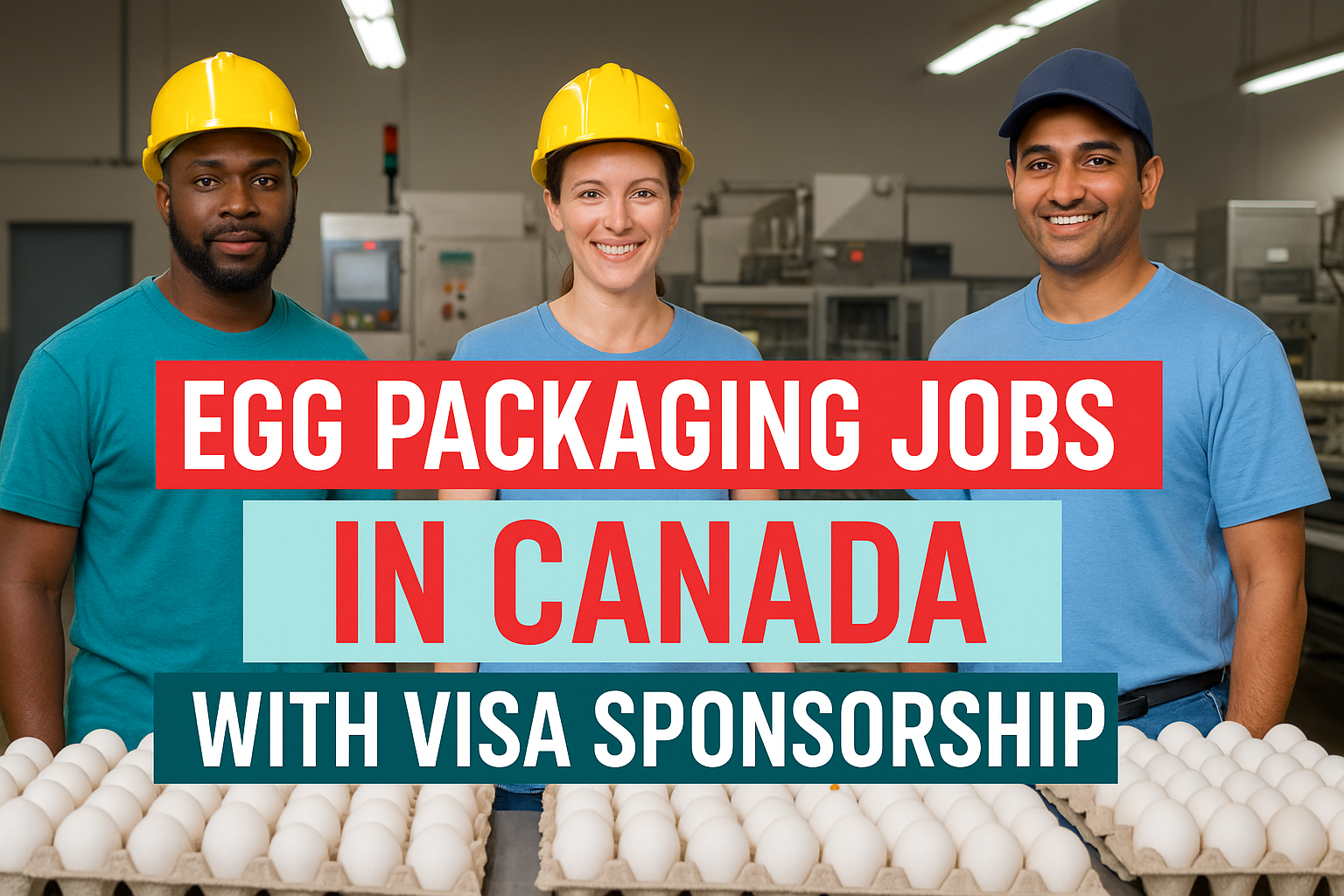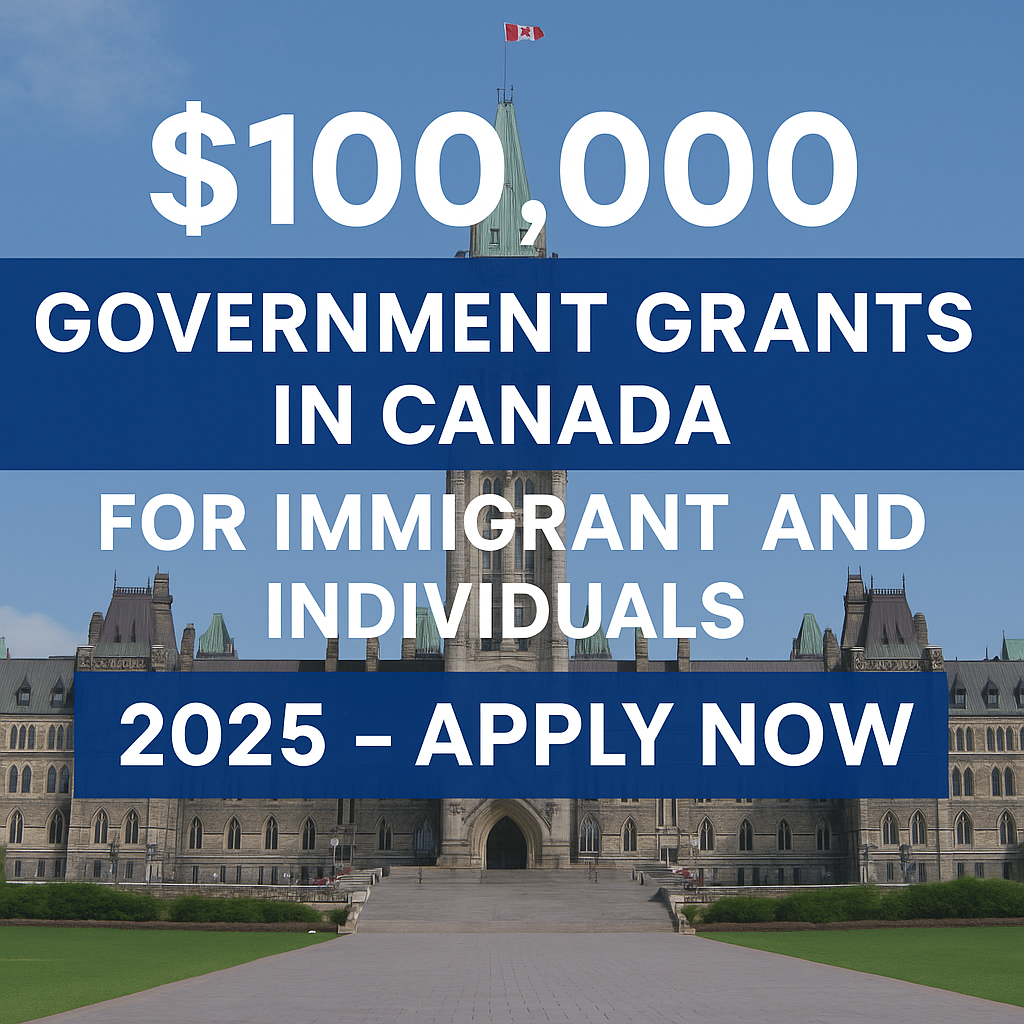Canada has become one of the top destinations for people looking to work abroad. With its strong economy, multicultural society, and welcoming immigration policies, thousands of international workers are relocating every year. Employers across industries are actively hiring foreign workers through visa sponsorship programs, offering not just stable jobs but also the chance to earn salaries as high as $95,000 per year.
What makes this opportunity even more attractive is that many Canadian employers provide full relocation support. This includes covering visa fees, airfare, housing assistance, and sometimes even family sponsorship. Whether you are a skilled professional, a trades worker, or a graduate with technical expertise, Canada has opportunities waiting.
In this article, we’ll explore the types of jobs available, top companies hiring, eligibility requirements, average salaries, and the exact steps you need to follow to secure a Canada visa sponsorship job.
Why Canada Offers Visa Sponsorship
Canada’s immigration system is designed to bring in workers who can support its economy and fill critical labor shortages. The government recognizes that local workers alone cannot meet the demand in key sectors, so it has created clear pathways for foreign workers through programs like the Temporary Foreign Worker Program (TFWP) and the International Mobility Program (IMP).
Here’s why Canadian employers often sponsor foreign workers:
1. Labor Shortages in Key Industries
Certain industries, such as healthcare, construction, and agriculture, face chronic labor shortages. Employers in these fields often rely on international workers to keep operations running.
2. An Aging Population
Canada has one of the fastest-aging populations in the world. As older workers retire, new workers are needed to replace them in both skilled and unskilled positions.
3. Support for Economic Growth
Canada’s economy continues to grow, especially in technology, finance, and energy. To stay competitive globally, the country must attract top international talent.
4. Pathways to Permanent Residency
Unlike many countries, Canada allows workers on sponsorship visas to transition to permanent residency (PR). This makes Canada especially attractive for those looking to settle long-term.
5. Employer Incentives
Employers benefit when they hire foreign workers. Many receive government support, and bringing in international employees helps them expand into global markets by adding diversity and skills.
Industries in High Demand
Not every field in Canada sponsors foreign workers, but several industries urgently need international talent. These are the top sectors where jobs are available with salaries reaching up to $95,000 annually:
1. Healthcare
Healthcare is one of the most in-demand fields in Canada. With hospitals and clinics short-staffed, opportunities are available for:
- Registered nurses
- Medical laboratory technologists
- Personal support workers (PSWs)
- Caregivers
- Average Salary Range: $60,000 – $90,000
2. Information Technology (IT)
Canada’s tech industry is growing rapidly, especially in cities like Toronto, Vancouver, and Montreal. Employers are actively sponsoring:
- Software developers
- Data analysts
- Cybersecurity specialists
- IT project managers
- Average Salary Range: $70,000 – $95,000
3. Skilled Trades
Canada is investing heavily in infrastructure, housing, and energy projects. This has created a major demand for skilled tradespeople, including:
- Electricians
- Welders
- Plumbers
- Construction managers
- Average Salary Range: $55,000 – $80,000
4. Agriculture and Food Processing
Farms and food production facilities across Canada depend on international workers to keep operations running. Sponsored roles include:
- General farm workers
- Food processing laborers
- Agricultural equipment operators
- Average Salary Range: $40,000 – $60,000
5. Finance and Business Services
Canada’s financial sector continues to grow, particularly in Toronto, which is often called the financial capital of the country. Visa sponsorship is common for:
- Accountants
- Auditors
- Financial analysts
- Risk managers
- Average Salary Range: $65,000 – $90,000
6. Hospitality and Tourism
Hotels, restaurants, and resorts often hire foreign workers for seasonal and permanent roles, such as:
- Chefs and cooks
- Hotel attendants
- Servers and bartenders
- Customer service staff
- Average Salary Range: $35,000 – $50,000
Top Companies Offering Visa Sponsorship in Canada
Not all employers in Canada provide visa sponsorship, but many large and reputable companies actively hire foreign workers. These employers often go through the Labour Market Impact Assessment (LMIA) process or hire through the International Mobility Program (IMP) to bring in international staff.
Here are some of the top companies across different sectors:
1. Healthcare Employers
- Mackenzie Health (Ontario) – Sponsors international nurses and medical technologists.
- Vancouver Coastal Health (British Columbia) – Frequently hires internationally trained nurses.
- Provincial Health Services Authority (PHSA) – Sponsors a range of healthcare professionals.
- Roles Sponsored: Nurses, caregivers, medical laboratory technologists.
Salary Range: $60,000 – $90,000.
2. Technology Companies
- Shopify (Toronto, Ottawa) – Known for hiring global tech talent, including developers and engineers.
- CGI Inc. (Montreal) – Sponsors software engineers, IT consultants, and cybersecurity experts.
- IBM Canada – Offers sponsorship for specialized IT roles.
- Roles Sponsored: Software developers, cybersecurity specialists, IT project managers.
Salary Range: $70,000 – $95,000.
3. Skilled Trades & Construction Employers
- EllisDon – One of Canada’s largest construction companies, often hires foreign workers.
- PCL Construction – Sponsors skilled trades like electricians, welders, and project managers.
- Aecon Group – Works on infrastructure projects and recruits skilled international talent.
- Roles Sponsored: Welders, electricians, plumbers, construction supervisors.
Salary Range: $55,000 – $80,000.
4. Agriculture & Food Processing Employers
- Maple Leaf Foods – A major food processing company that sponsors laborers and supervisors.
- Cargill Canada – Hires international workers for food production and agriculture.
- Canada’s Greenhouse Farms – Employ foreign farm workers and equipment operators.
- Roles Sponsored: Farm laborers, food processing staff, operators.
Salary Range: $40,000 – $60,000.
5. Finance and Professional Services
- Deloitte Canada – Sponsors auditors, consultants, and accountants.
- PwC Canada – Hires international finance professionals.
- RBC (Royal Bank of Canada) – Offers visa sponsorship for financial analysts and tech-focused roles.
- Roles Sponsored: Accountants, auditors, financial analysts, risk managers.
Salary Range: $65,000 – $90,000.
6. Hospitality & Tourism Employers
- Fairmont Hotels & Resorts – A major employer of international hospitality staff.
- Tim Hortons – Frequently hires foreign workers under LMIA.
- Marriott International Canada – Sponsors staff for hotel operations and food services.
- Roles Sponsored: Chefs, cooks, servers, housekeeping staff.
Salary Range: $35,000 – $50,000.
Salary Breakdown by Job Roles
Salaries in Canada vary depending on your industry, role, and location. Below is a breakdown of average annual salaries for visa-sponsored jobs:
| Job Role | Average Salary (CAD) | High Range (CAD) |
|---|---|---|
| Registered Nurse | $70,000 | $90,000 |
| Software Developer | $80,000 | $95,000 |
| Cybersecurity Specialist | $78,000 | $92,000 |
| Construction Electrician | $55,000 | $75,000 |
| Welder | $50,000 | $70,000 |
| Accountant | $65,000 | $85,000 |
| Financial Analyst | $68,000 | $90,000 |
| Farm Worker | $40,000 | $55,000 |
| Food Processing Worker | $42,000 | $60,000 |
| Hotel Supervisor | $48,000 | $60,000 |
Note: Salaries are averages and may vary by province. Tech jobs in Toronto or Vancouver often pay higher, while trades and agricultural roles are spread across provinces like Alberta, Manitoba, and Saskatchewan.
Eligibility Requirements for Canada Visa Sponsorship Jobs
Before applying for visa sponsorship jobs in Canada, you must meet the minimum eligibility standards set by the Canadian government and employers. While requirements vary depending on the job and visa type, the following are common across most applications:
1. Valid Passport
You must hold a valid passport, typically valid for at least six months beyond your intended stay.
2. Job Offer From a Canadian Employer
A valid job offer from an employer authorized to sponsor international workers is required. Employers must either obtain an LMIA (Labour Market Impact Assessment) or qualify under LMIA-exempt categories.
3. Education and Work Experience
- For professional roles: A bachelor’s degree or higher in a relevant field.
- For skilled trades: Vocational training, apprenticeship certificates, or proof of practical experience.
- Most employers also expect at least 1–3 years of relevant work experience.
4. English or French Language Proficiency
Canada requires proof of language ability in English or French. You may need to take an approved test such as:
- IELTS General (English)
- CELPIP (English)
- TEF Canada (French)
Minimum scores vary, but a CLB 5–7 is common for many sponsored roles.
5. Financial Capacity
Even if the employer covers relocation, you may need to show funds to support yourself until you receive your first paycheck.
6. Health and Security Clearance
- A medical examination by a panel physician is required.
- A police clearance certificate from your country of residence to prove good character.
7. Genuine Intent
- Applicants must prove they intend to work in Canada legally and comply with all visa conditions.
- Visa Pathways for Sponsorship in Canada
Several visa programs allow Canadian employers to bring in foreign workers. Here are the main pathways:
1. Temporary Foreign Worker Program (TFWP)
- Employers must obtain an LMIA, proving no local Canadian is available for the job.
- Common in healthcare, agriculture, and trades.
- Work permits are issued for a set duration, usually 1–2 years, renewable.
2. International Mobility Program (IMP)
- Does not require LMIA.
- Covers roles under trade agreements (e.g., USMCA for U.S. and Mexican citizens) and intra-company transfers.
- Common for IT and finance roles.
3. Provincial Nominee Program (PNP) With Employer Support
- Provinces like Ontario, Alberta, and British Columbia nominate workers for permanent residency if they have a valid employer job offer.
- Provides a pathway to Permanent Residency (PR).
4. Atlantic Immigration Program (AIP)
- Employers in Atlantic provinces (Newfoundland, New Brunswick, Nova Scotia, Prince Edward Island) can hire foreign workers without LMIA.
- Focuses on healthcare, trades, and hospitality jobs.
5. Express Entry With Job Offer
- A valid job offer can boost your Express Entry profile significantly.
- High-demand roles like IT, healthcare, and finance are prioritized.
Step-by-Step Application Process
Here is a clear guide to applying for a Canada visa sponsorship job:
Step 1: Find a Sponsoring Employer
Search for jobs on:
Job Bank Canada (www.jobbank.gc.ca
Indeed Canada (www.indeed.ca
LinkedIn Jobs (www.linkedin.com/jobs
Look for postings that mention “LMIA available” or “visa sponsorship offered
Step 2: Apply for the Job
- Prepare a Canadian-style resume (simple, 1–2 pages).
- Write a tailored cover letter explaining your skills and willingness to relocate.
Step 3: Receive a Job Offer
If selected, the employer will send a formal job offer letter outlining salary, role, and responsibilities.
Step 4: Employer Applies for LMIA (if required)
- For most TFWP jobs, your employer applies for an LMIA.
- If approved, you will receive a copy of the LMIA and your offer letter.
Step 5: Apply for a Work Permit
- Submit your application through the Immigration, Refugees and Citizenship Canada (IRCC) website www.canada.ca
Required documents include:
- Job offer letter
- LMIA approval (if applicable)
- Passport
- Language test results
- Medical and police clearance certificates
Step 6: Attend Biometrics & Interview (if required)
- You may be asked to give biometrics (fingerprints and photo).
- Some applicants may be interviewed.
Step 7: Wait for Approval
- Processing times vary, usually 2–6 months depending on the visa program.
Step 8: Relocate and Begin Work
- Once approved, you will receive a work permit letter of introduction.
- Travel to Canada, present documents at the border, and begin your sponsored employment.
Challenges of Canada Visa Sponsorship Jobs
While the benefits are clear—high salaries, relocation support, and potential pathways to permanent residency—visa sponsorship jobs also come with challenges that applicants should prepare for.
1. High Competition
Thousands of people worldwide apply for the same sponsorship jobs. Employers often receive hundreds of applications for a single role.
Tip: Tailor your resume and cover letter for each application. Highlight your unique skills and Canadian work readiness.
2. Processing Delays
Work permit processing can take several months, depending on your country of residence and visa type.
Tip: Apply early and ensure all documents are accurate to avoid delays.
3. Cost of Relocation
While some employers cover relocation, others may not pay for everything. Moving to Canada can still involve personal expenses.
Tip: Save enough to cover initial living costs until your first paycheck arrives.
4. Adjustment to Canadian Workplace Culture
Canadian workplaces value punctuality, teamwork, and communication. Adapting to new norms can take time.
Tip: Be open to learning and seek orientation programs offered by employers or community groups.
5. Licensing Requirements for Certain Professions
Some roles (nursing, engineering, teaching) require Canadian certifications. Without these, you may face delays in starting work.
Tip: Begin credential evaluation and licensing before relocating, if possible.
Frequently Asked Questions (FAQs)
1. What is a visa sponsorship job in Canada?
It’s a role where the employer supports your work permit application, often through the LMIA process or LMIA-exempt pathways.
2. How much can I earn in a sponsorship job?
Salaries vary by industry, but many sponsored jobs pay between $45,000 and $95,000 annually.
3. Do I need an LMIA for every job?
Not always. Some programs, like the International Mobility Program (IMP), allow sponsorship without LMIA.
4. Can my family join me on a sponsored work visa?
Yes. Many sponsorship visas allow dependents (spouse and children) to apply for open work permits or study permits.
5. Which industries sponsor the most foreign workers?
Healthcare, IT, skilled trades, agriculture, finance, and hospitality are leading sectors.
6. How long does it take to process a work permit?
Processing times vary, usually 2–6 months, depending on your location and visa category.
7. Do I need to prove English or French proficiency?
Yes. Most sponsorship jobs require IELTS, CELPIP, or TEF scores to prove language ability.
8. What if my application is rejected?
You can reapply after correcting mistakes, or explore other visa programs such as Express Entry or Provincial Nominee Programs.
9. Do sponsorship jobs lead to permanent residency?
Yes. Many programs, especially PNP and Express Entry with job offers, allow workers to transition to permanent residency.
10. Where can I find legitimate sponsorship job postings?
Use official platforms like Job Bank (www.jobbank.gc.ca
Conclusion
Canada’s visa sponsorship jobs are a golden opportunity for skilled workers, tradespeople, and professionals who want to earn a good salary and build a better future. With annual earnings of up to $95,000, relocation support, and clear pathways to permanent residency, these roles offer more than just financial stability—they open the door to a new life in a country known for diversity and quality of living.
The key to success is preparation. Avoid common mistakes, apply to employers with a history of sponsorship, and meet all eligibility requirements. By following the step-by-step process, from finding a job to applying for a work permit, you can increase your chances of approval.
Your Canadian dream is possible. Start today by exploring official job portals, preparing your documents, and applying to companies ready to welcome international talent. The opportunity is real—and it’s waiting for you.



